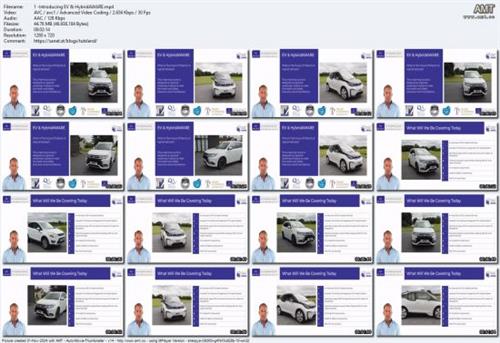EV & HybridAWARE eLearning Course
EV & HybridAWARE eLearning Course
![EV & HybridAWARE eLearning Course]()
In this EV & HybridAWARE eLearning course, we will give you an overview of Electric and Hybrid Vehicles.
What you'll learn
Introducing Electric & Hybrid Vehicles
What Are Electric Vehicles
What Are Hybrid Vehicles
How Do I Identify If A Vehicle Is Hybrid Or EV
Advantages And Disadvantages Of EV
Advantages And Disadvantages Of Hybrids
Health & Safety Policy Surrounding EVs & Hybrids
Challenges Of Servicing Electric Vehicles
Hazards Associated When Working With Electric Vehicles
Managing EV & Hybrid Incidents On The Roadside
Requirements
No experience needed
Description
Course Outline: Electric Vehicle & Hybrid TechnologyCourse Objectives:Understand the key components of electric and hybrid vehicles.Learn the safe procedures for powering up and down these systems.Acquire knowledge of safe isolation techniques for roadside and recovery personnel.Develop skills in identifying potential hazards and implementing appropriate safety measures.Course Content:1. Introduction to Electric and Hybrid Vehicles:Definition and types of electric vehicles (EVs) and hybrid electric vehicles (HEVs).Comparison of EVs and HEVs to traditional internal combustion engine (ICE) vehicles.Overview of the benefits and challenges of EV and HEV technology.2. Key Components of Electric and Hybrid Vehicles:Battery technology: Lithium-ion batteries, nickel-metal hydride batteries, and others.Electric motors and generators: Types, characteristics, and operation.Power electronics: Inverters, converters, and controllers.Charging infrastructure: Charging stations, home charging, and portable chargers.3. Safety Considerations for Electric and Hybrid Vehicles:High voltage systems: Identifying high-voltage components and risks.Electrical hazards: Electrocution, arc faults, and thermal hazards.Thermal runaway: Understanding the risks and prevention measures.Battery fires: Causes, prevention, and response.4. Safe Handling and Isolation Procedures:Identifying high-voltage components and isolation points.Using appropriate safety equipment and procedures.Disabling the vehicle's electrical systems safely.Safe loading and recovery techniques for EVs and HEVs.5. Emergency Response and First Aid:Responding to accidents involving EVs and HEVs.Providing first aid to individuals injured in EV or HEV accidents.Understanding the specific hazards associated with EV and HEV accidents.6. Practical Exercises and Simulations:Hands-on experience with EV and HEV components.Simulated accident scenarios and response drills.Practice using safety equipment and procedures.By completing this course, learners will gain the necessary knowledge and skills to work safely with electric and hybrid vehicles, minimizing the risks associated with these technologies.
Who this course is for
In this EV & HybridAWARE eLearning course, we will give you an overview of Electric and Hybrid Vehicles, evaluate the positives and negatives of a hybrid system, identify types of electric or hybrid vehicles at scene of incident or breakdown, and recognise potential hazards involved when dealing with Electric and Hybrid Vehicles.
Homepage:
![EV & HybridAWARE eLearning Course]()
Say "Thank You"
rapidgator.net:
ddownload.com:

Published 11/2024
MP4 | Video: h264, 1280x720 | Audio: AAC, 44.1 KHz, 2 Ch
Language: English | Duration: 29m | Size: 598 MB
MP4 | Video: h264, 1280x720 | Audio: AAC, 44.1 KHz, 2 Ch
Language: English | Duration: 29m | Size: 598 MB
In this EV & HybridAWARE eLearning course, we will give you an overview of Electric and Hybrid Vehicles.
What you'll learn
Introducing Electric & Hybrid Vehicles
What Are Electric Vehicles
What Are Hybrid Vehicles
How Do I Identify If A Vehicle Is Hybrid Or EV
Advantages And Disadvantages Of EV
Advantages And Disadvantages Of Hybrids
Health & Safety Policy Surrounding EVs & Hybrids
Challenges Of Servicing Electric Vehicles
Hazards Associated When Working With Electric Vehicles
Managing EV & Hybrid Incidents On The Roadside
Requirements
No experience needed
Description
Course Outline: Electric Vehicle & Hybrid TechnologyCourse Objectives:Understand the key components of electric and hybrid vehicles.Learn the safe procedures for powering up and down these systems.Acquire knowledge of safe isolation techniques for roadside and recovery personnel.Develop skills in identifying potential hazards and implementing appropriate safety measures.Course Content:1. Introduction to Electric and Hybrid Vehicles:Definition and types of electric vehicles (EVs) and hybrid electric vehicles (HEVs).Comparison of EVs and HEVs to traditional internal combustion engine (ICE) vehicles.Overview of the benefits and challenges of EV and HEV technology.2. Key Components of Electric and Hybrid Vehicles:Battery technology: Lithium-ion batteries, nickel-metal hydride batteries, and others.Electric motors and generators: Types, characteristics, and operation.Power electronics: Inverters, converters, and controllers.Charging infrastructure: Charging stations, home charging, and portable chargers.3. Safety Considerations for Electric and Hybrid Vehicles:High voltage systems: Identifying high-voltage components and risks.Electrical hazards: Electrocution, arc faults, and thermal hazards.Thermal runaway: Understanding the risks and prevention measures.Battery fires: Causes, prevention, and response.4. Safe Handling and Isolation Procedures:Identifying high-voltage components and isolation points.Using appropriate safety equipment and procedures.Disabling the vehicle's electrical systems safely.Safe loading and recovery techniques for EVs and HEVs.5. Emergency Response and First Aid:Responding to accidents involving EVs and HEVs.Providing first aid to individuals injured in EV or HEV accidents.Understanding the specific hazards associated with EV and HEV accidents.6. Practical Exercises and Simulations:Hands-on experience with EV and HEV components.Simulated accident scenarios and response drills.Practice using safety equipment and procedures.By completing this course, learners will gain the necessary knowledge and skills to work safely with electric and hybrid vehicles, minimizing the risks associated with these technologies.
Who this course is for
In this EV & HybridAWARE eLearning course, we will give you an overview of Electric and Hybrid Vehicles, evaluate the positives and negatives of a hybrid system, identify types of electric or hybrid vehicles at scene of incident or breakdown, and recognise potential hazards involved when dealing with Electric and Hybrid Vehicles.
Homepage:
https://www.udemy.com/course/ev-hybridaware-elearning-course/Screenshots

Say "Thank You"
rapidgator.net:
ddownload.com: